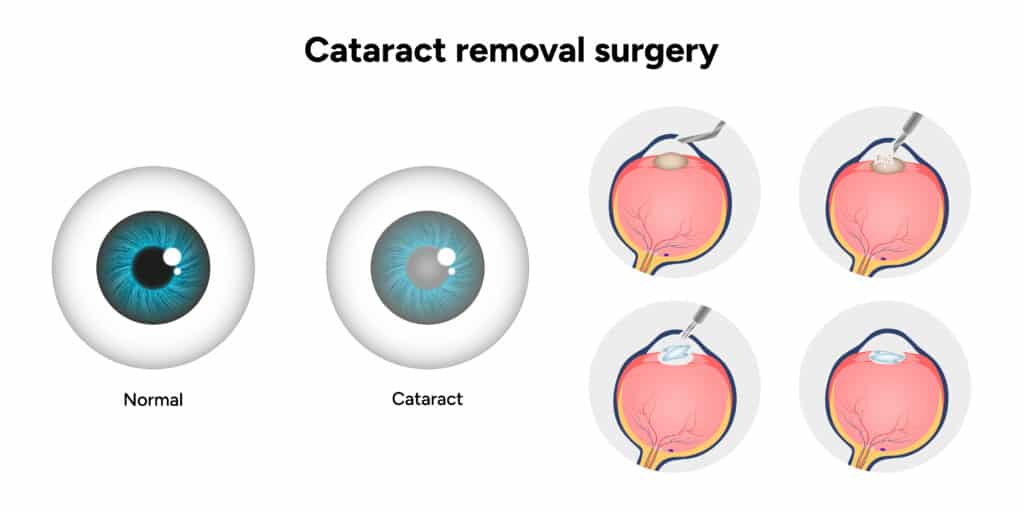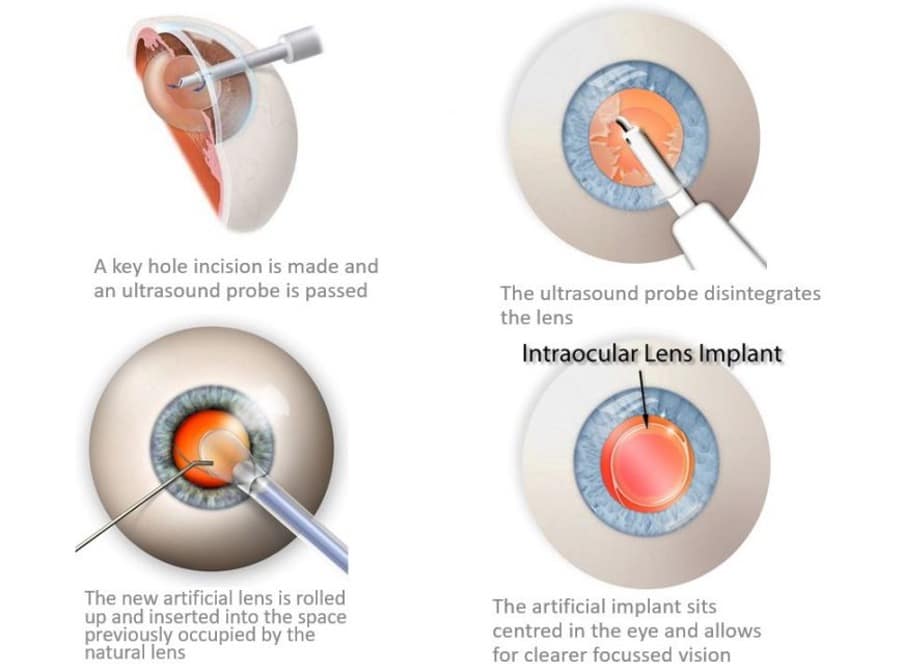Poor vision after 40 can disrupt your daily life and make simple tasks harder to do. The good news is that modern eye surgery has proven to be a soaring win. Cataract surgery helps restore clear vision to millions each year with a 98.5% success rate worldwide. Our expert surgeons at Precision Vision London perform thousands of these life-changing procedures annually with outstanding results.
Your eyes change naturally with age, which affects how clearly you see. Cloudy vision and focus problems often stem from conditions like presbyopia and early cataracts. Modern surgical treatments such as cataract and lens replacement surgery are great solutions. About 95% of patients don’t need glasses or contacts after lens replacement surgery. The quick 25-30 minute procedure lets you go home the same day.
This piece explains why vision changes happen after 40, how doctors find the cause of blurry vision, and what advanced surgical options can help restore clear sight. Most patients see substantial improvement in their vision clarity within days after surgery. This helps them return to daily activities with better visual confidence.

Losing Clear Vision After 40: What’s Really Happening?
Your eyes naturally start to show signs of ageing in your early 40s. These gradual changes affect almost everyone, but most people don’t understand what’s happening to their vision.
Understanding presbyopia and how it affects you
Presbyopia represents a natural transformation in your vision. The crystalline lens inside your eye loses its flexibility with age. This stiffening makes it harder to focus on nearby objects. Reading becomes more challenging, and you might find yourself holding books at arm’s length. This condition affects almost everyone between ages 40-45. Daily tasks like reading phone messages, looking at price tags, or working on computers can become frustrating.

Early cataract development and its signs
Your eye’s natural lens becomes cloudy as cataracts develop. The protein structure breaks down over time, and the cloudiness progresses slowly.
Early signs include:
- Bright headlights cause more glare during night driving
- Colours look less vibrant or take on a yellowish tint
- Reading requires brighter light
- One eye sees double images or “ghost” images
Most patients say it feels like looking through a dirty window or smudged glasses. The specialists at Precision Vision London use advanced technology to detect these changes early.
Blurry vision that needs attention
Blurry vision might seem like a minor nuisance, but ongoing changes need professional care. You should get an expert assessment if:
- Reading glasses don’t help with daily activities
- Your vision changes substantially throughout the day
- Your visual clarity changes suddenly
- Regular glasses no longer work well enough
The consultant ophthalmologists at Precision Vision London can determine whether your blurry vision comes from normal ageing or needs immediate treatment. Quick action improves your current lifestyle and protects your vision for years to come.
How We Diagnose the Root Cause of Blurry Vision
A proper diagnosis is the foundation that helps treat blurry vision effectively. Precision Vision London uses advanced diagnostic technology to pinpoint the exact cause of your visual changes before suggesting any treatment.
Complete eye exams and imaging
Finding the root cause of blurry vision needs more than a simple vision test. Our complete eye examinations assess your visual health through multiple tests. These detailed exams can spot developing eye problems before symptoms become noticeable, unlike limited vision screenings.
Your assessment has:
- Visual acuity testing to measure vision sharpness
- Tonometry to check internal eye pressure
- Slit lamp examination of your eye’s structures
- A detailed look at your medical history
On top of that, we use advanced imaging techniques like Optical Coherence Tomography (OCT) that creates high-resolution 3D scans of your retina. This technology helps us detect sight-threatening conditions up to four years earlier than traditional methods.
Identifying PCO, corneal issues, or retinal changes
Some patients develop Posterior Capsular Opacification (PCO) after cataract surgery when cells grow over the back of the lens capsule and cause renewed cloudiness. Our specialists use a careful slit lamp examination to spot the characteristic semi-opaque membrane forming on the posterior capsule.
Our diagnostic process looks for:
- Early signs of macular degeneration
- Diabetes-related retinopathy
- Corneal changes affecting vision clarity
- Optic nerve health and function
Assessing suitability for lens replacement surgery
Our consultant eye surgeons really scan and test your eyes during your first consultation to determine if lens replacement surgery suits you. This personalised assessment maps your corneal shape, measures corneal thickness, and checks your pupil size in various lighting conditions. Contact lens wearers need a lens-free period—typically one week for soft lenses and four weeks for rigid gas-permeable lenses to get accurate results. This approach will give us precise measurements of your eye’s natural state and helps create a customised surgical plan that matches your visual needs.
Surgical Treatments That Restore Clarity
Advanced surgical techniques now give us amazing ways to restore clear vision affected by ageing. These procedures can fix specific vision problems and have great success rates.
Cataract surgery with advanced IOLs
Your cloudy natural lens gets replaced with a clear, artificial intraocular lens (IOL) during cataract surgery. This procedure removes cataracts and fixes vision problems like myopia, hyperopia, presbyopia, and astigmatism. You can choose from several IOL options:
- Monofocal IOLs give clear vision at one distance (usually far), but you might need reading glasses
- Multifocal/trifocal IOLs help you see at multiple distances and reduce your need for glasses by a lot
- Extended Depth of Focus (EDOF) IOLs give you smooth intermediate and distance vision with fewer side effects
About 95% of patients can see well enough to drive or better after this procedure.
Refractive Lens Exchange (RLE) explained
RLE works just like cataract surgery but we do it mainly to help people depend less on glasses instead of removing cataracts. This procedure helps people over 40 who have presbyopia and prevents cataracts from developing later since we replace the natural lens. Each eye takes about 30-60 minutes, and we usually treat the second eye a week after the first one.

YAG Laser Capsulotomy for secondary cataracts
About 50% of patients develop Posterior Capsular Opacification (PCO) within five years after cataract or lens replacement surgery. PCO happens when the membrane behind your new lens gets cloudy and causes vision problems again. A quick, painless 5-minute YAG laser capsulotomy in our office creates an opening in this cloudy membrane. Studies show 83-96% of patients see better after this treatment.
Managing residual refractive errors
Some patients need extra correction even after successful lens surgery. Here are your options:
- Laser vision correction (LASIK or PRK) – the quickest way to fix leftover vision problems
- Arcuate keratotomy for astigmatism
- Piggyback IOLs – more reliable than IOL exchange in specific cases
Precision Vision London offers advanced surgical options that match your age, lifestyle, and eye health. Book your consultation today to start seeing clearly again.
What to Expect from Your Recovery and Results
Patients usually see better vision faster after lens replacement or cataract surgery. Our team at Precision Vision London provides complete aftercare to help you get the best results from your procedure.
Timeline for vision improvement
Your vision starts getting better right after surgery, though things look blurry at first while your eye adjusts to the new lens. Most patients see major improvements within 24-48 hours. The biggest changes happen in the first few days to weeks. Many people go back to work after about three days, but it takes 2-3 weeks for vision to fully settle. Reading gets better faster with premium multifocal lens implants.
Tips for a smooth recovery
The best way to heal properly is to follow these important steps:
- Make sure your hands are really clean before touching your eyes
- Take your eye drops exactly as prescribed to stop infection and reduce swelling
- Put on protective eyewear outdoors and use your eye shield while sleeping
- Stay away from swimming for 4-6 weeks and avoid heavy exercise for 7-10 days
- Don’t drive until your vision is stable and our clinical team gives you the green light
Your eye needs up to eight weeks to heal completely, but you’ll be able to do most regular activities much earlier. Our specialists suggest staying away from dusty or smoky places for about two weeks after your surgery.
When to seek help for persistent blurry vision
Call our clinic right away if your vision stays blurry for more than 48 hours after surgery. Get immediate medical help if you notice:
- Bad eye pain that over-the-counter medicine doesn’t help
- Sudden changes in vision or major vision loss
- More redness, swelling or discharge from your eye
- Light flashes or a sudden increase in floaters
Long-term benefits of early intervention
Taking care of vision problems quickly through surgery gives you major benefits in the long run. Research shows patients who got early cataract surgery had a 25% lower risk of long-term cognitive impairment and dementia compared to people with untreated cataracts. Early treatment helps you stay independent and reduces your risk of accidents from poor vision.
Book your consultation today and start seeing clearly again. Our expert care and advanced surgical techniques help most patients achieve driving standard vision or better at Precision Vision London.
Conclusion
Quality vision plays a crucial role in your life, particularly after age 40. People once accepted poor eyesight from presbyopia and early cataracts as normal ageing signs. This viewpoint has definitely changed. Modern surgical treatments now show remarkable success rates. 95% of patients achieve driving standard vision or better after lens replacement surgery.
Precision Vision London leads these state-of-the-art developments by combining advanced diagnostic technology with expert surgical techniques. Our detailed eye examinations find vision problems earlier than standard methods. We create personalised treatment plans that match your needs. Our consultant ophthalmologists deliver excellent results through cataract surgery with premium IOLs, Refractive Lens Exchange, or YAG laser capsulotomy.
These surgical procedures not only restore clear vision but also provide lasting benefits. Studies show early cataract treatment associates with a 25% lower risk of cognitive impairment. It helps maintain independence and reduces accident risks.
Patients recover more quickly than expected. Most people see major improvements within 24-48 hours after surgery, though complete stability takes a few weeks. Our dedicated aftercare team will give you expert guidance throughout your healing experience.
Blurry vision shouldn’t become your normal after 40. Precision Vision London’s proven solutions restore clarity and improve your visual confidence. Book your consultation today and see what expert care can do. Your path to clearer vision begins with one step.
Key Takeaways
Vision changes after 40 are natural but treatable, with modern eye surgery offering exceptional success rates and rapid recovery times for restoring clear sight.
- Presbyopia and early cataracts commonly cause blurry vision after 40, but advanced surgical treatments achieve 95-98.5% success rates in restoring clarity
- Comprehensive eye exams using OCT imaging can detect sight-threatening conditions up to four years earlier than traditional methods
- Cataract surgery and lens replacement take just 25-30 minutes, with most patients experiencing significant vision improvement within 24-48 hours
- Around 95% of patients no longer need glasses after lens replacement surgery, with many returning to work within three days
- Early intervention reduces long-term cognitive impairment risk by 25% whilst preserving independence and reducing accident risks
The key to successful treatment lies in prompt professional assessment and choosing the right surgical approach for your specific needs. With proper diagnosis and expert care, you can expect to regain clear, confident vision that enhances your daily life for years to come.
FAQs
Q1. At what age do people typically start experiencing vision changes? Most people begin to notice changes in their vision around age 40-45. This is when presbyopia, a natural age-related condition affecting the eye’s ability to focus on close objects, commonly starts to develop.
Q2. What are the main surgical options for restoring clear vision after 40? The primary surgical treatments include cataract surgery with advanced intraocular lenses (IOLs), Refractive Lens Exchange (RLE), and YAG Laser Capsulotomy for secondary cataracts. These procedures can effectively address age-related vision issues and reduce dependence on glasses.
Q3. How long does recovery take after lens replacement surgery? While many patients notice significant vision improvement within 24-48 hours, full visual stabilisation typically takes 2-3 weeks. Most people can return to work after about three days, but it’s important to follow post-operative care instructions for optimal healing.
Q4. What percentage of patients achieve good vision after lens replacement surgery? Approximately 95% of patients achieve driving standard vision or better following lens replacement surgery. Many no longer need to wear glasses or contact lenses for most daily activities after the procedure.
Q5. Are there any long-term benefits to addressing vision problems early? Yes, early intervention for vision problems can have significant long-term benefits. Studies show that patients who undergo early cataract surgery have a 25% lower risk of cognitive impairment and dementia. Additionally, addressing vision issues promptly helps preserve independence and reduces the risk of accidents related to poor eyesight.
Authors & Reviewer
-
 Olivia: Author
Olivia: AuthorHi, I'm Olivia, a passionate writer specialising in eye care, vision health, and the latest advancements in optometry. I strive to craft informative and engaging articles that help readers make informed decisions about their eye health. With a keen eye for detail and a commitment to delivering accurate, research-backed content, I aim to educate and inspire through every piece I write.
-
 Dr. CT Pillai: Reviewer
Dr. CT Pillai: ReviewerDr. CT Pillai is a globally recognised ophthalmologist with over 30 years of experience, specialising in refractive surgery and general ophthalmology. Renowned for performing over 50,000 successful laser procedures.
